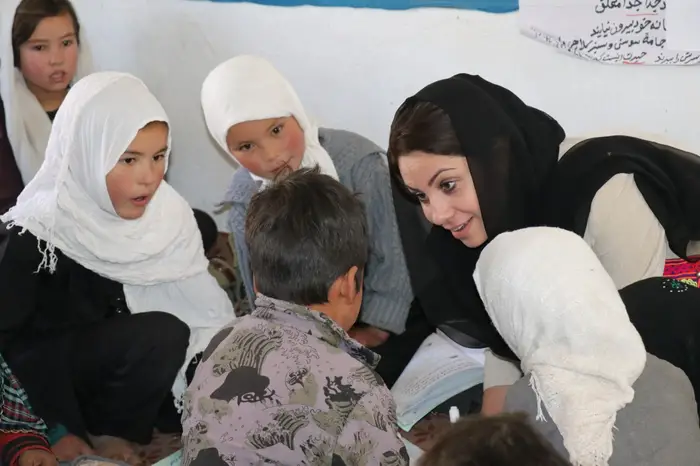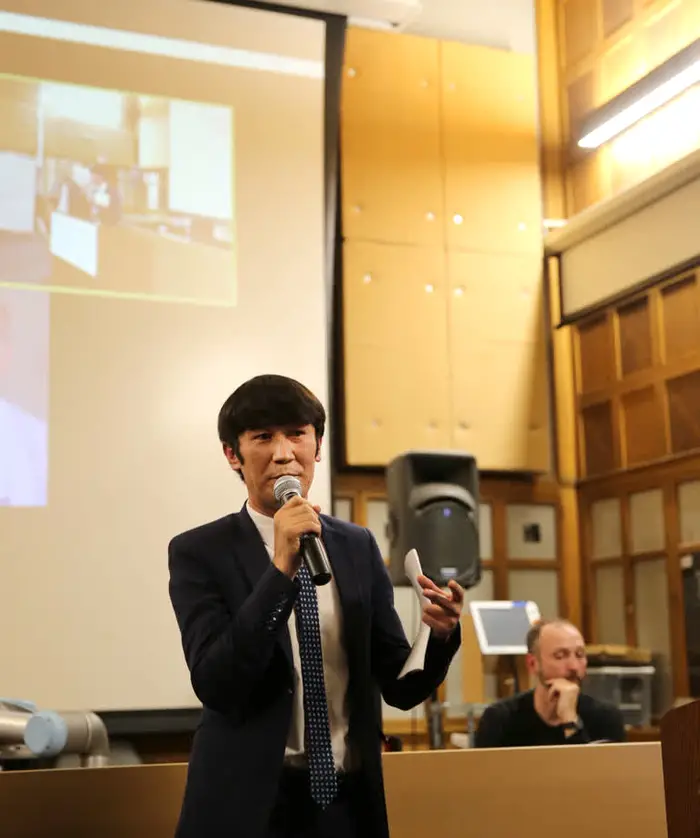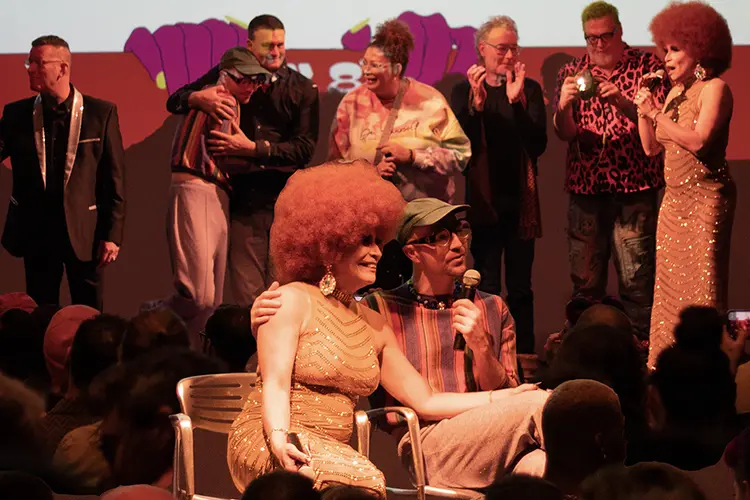
CMU Artists and Scholars at Risk Program Supports Academic Freedom Worldwide
Media Inquiries
On the evening of Oct. 3, the doors of the Frank-Ratchye STUDIO for Creative Inquiry(opens in new window) transformed into a gateway to a faraway place. With just a few steps, entrants could be carried from Carnegie Mellon University to Afghanistan by the smell of Persian spice and the gentle musical work of Ahmad Zahir.
For a single night, the STUDIO brought to Pittsburgh the culture in which author Homeira Qaderi(opens in new window) chronicled her upbringing amid Russian occupation, civil war and the Taliban’s imposition of Sharia Law.
As the attendees listened to her words, the imagery of life in Afghanistan was made all the more vivid as she read an excerpt from her memoir “Dancing in the Mosque: An Afghan Mother’s Letter to her Son.”
“For me, Afghanistan was divided between the street in front of our house where I played during ceasefires, and the dangerous world beyond our walls when war returned and kept me stuck inside,” Qaderi read aloud. “I was a bright, playful child, too young and energetic to understand fear, whether of invisible bullets buzzing through the air, or of Russian tanks rumbling in the street outside our house.”
Lisa Velten Smith(opens in new window), a professional actor and assistant professor of voice in the School of Drama, participated in the event as well, picking up on Qaderi’s narration for much of the event.
When Smith finished reading, a sympathetic figure integral in bringing Qaderi to CMU then joined her on stage and hosted the evening’s Q&A: event moderator and Visiting Professor of Afghan Cinema and Theater Habib Sorosh, who came to Carnegie Mellon in 2022 through the Scholars at Risk Network(opens in new window) after a decade of teaching in the Department of Fine Arts and Dramatic Literature at Kabul University.
The event, titled "Afghan Dinner and a Reading," is one of several to be hosted as a part of Carnegie Mellon University's Artists and Scholars at Risk (ASAR)(opens in new window) program.
The program began in 2022 with support from James H. Garrett Jr.(opens in new window), provost and chief academic officer, in response to increased migration from countries like Afghanistan and Syria. The program brings individuals from a variety of backgrounds to share their perspectives as visiting research faculty, while providing them with salary assistance and a local social support structure.
“The scholars who have come to CMU by way of ASAR have brought their talents, perspectives, and intellectual engagement to our community and for that, we are grateful,” shared Garrett, “It is a program I am very proud to support, and it deepens our commitment to academic freedom as an institution of higher education.”
An assortment of organizations collaborate with the Center for the Arts in Society(opens in new window) to showcase the artistic and intellectual work of creatives like Qaderi and Sorosh: The Frank-Ratchye STUDIO for Creative Inquiry, The Humanities Scholars Program Diane and Bradford Smith Family Fund(opens in new window), The Humanities Center(opens in new window), CMU’s Sustainability Initiative(opens in new window), and The Center for Black European Studies and the Atlantic(opens in new window).
Carnegie Mellon: A safe haven for scholars
Wendy Arons(opens in new window), director of the Center for Arts in Society, said the program offers visiting scholars the opportunity to research and share their craft in a safe and supportive environment.
"Our ASAR fellows are people who are carrying a lot of trauma with them. How do we make sure that we support them and make it possible for them to be able to turn their attention back to their creative goals and career?"
Another aim of the program is to help scholars adjust to the cultural differences that often come with seeking refuge in another country. The program has partnered with organizations like the Pittsburgh-based nonprofit City of Asylum(opens in new window) to help visiting scholars connect with local diasporic communities, find social and economic support for expenses outside education (e.g. housing and amenities), and engage with the wider Pittsburgh community.
This week, CMU will also host the U.S. Scholars at Risk General Assembly(opens in new window), bringing together several higher-education institutions who provide such support to scholars at risk.
While the network includes over 650 institutions, Carnegie Mellon is one of the only universities whose program name directly mentions artists as well as scholars.
"One of our ASAR fellows said, 'You know, it has been two years since I've just felt like I could let myself be vulnerable to my creative muse to write again,'" Arons said. "There's just so much anxiety attendant on the circumstances that led people to have to leave their home country, which often has to do with threat of arrest or harm, either to family members or themselves."
Through community events like film showings or readings, the program gives scholars the opportunity to express themselves and hear constructive feedback from like-minded academics and creatives without fear for their well-being.
"When you're an artist, you're always taking emotional and psychological risks. If we can provide conditions in which the scholars who come here start to feel like they can have the emotional safety to pursue their art, then I think we've done a really good job."
ASAR and CMU's global impact
Lisa Krieg(opens in new window) is associate vice president for Global Strategic Initiatives and Institutional Accreditation(opens in new window). In her role, Krieg identifies opportunities to develop international partnerships that strengthen our global education footprint, and support academic units in their entrepreneurial endeavors.
As one of the members of the Artists and Scholars at Risk Steering Committee, Krieg has helped determine the direction of the program and witnessed it grow since its inception.
"The term scholars at risk is a broad term that's used in the field to talk about individuals from academia who become at-risk for a variety of reasons." Krieg said.
"They could be a scientist, a writer, an artist, a journalist — all kinds of people can come from a situation where their safety is not assured in their home country," she added. "It could be that they are from a war-torn country. It could be because of what they said, or what they did not say. It could be that the politics of their country suddenly change, and they go from being able to express themselves freely to not being able to do so."
Having worked with international students, researchers and faculty members at Carnegie Mellon for nearly 25 years, Krieg said the program holds a very special place for her.
"CMU has one of the highest percentages of international students of any U.S. university. We have the privilege of benefiting from thousands of intelligent young people coming to school here every year," Krieg said. "Supporting threatened scholars is a small but important way that our institution can contribute to the impact that we have."




